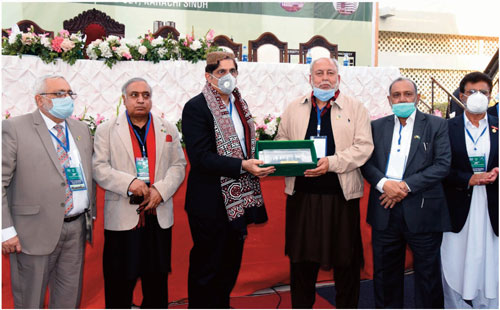Sindh Chief Minister Murad Ali Shah has said that Sindh being the second largest province of Pakistan and Karachi being its provincial capital is the economic and industrial hub of the country, contributing $164 billion of GDP as reported in 2019. He was speaking at 26th Annual General Body Meeting of Pakistan Engineering Council here at NED University of Engineering & Technology on Friday. He said that he graduated from NED University, Karachi in 1986. “Being a part of the most prestigious, professional and prudent community of the country, I assure all my efforts for the betterment of the engineering profession,” he said. He congratulated PAC on successful conduct of AGM-2020 during this testing time of pandemic Covid-19 outbreak. Shah said that Sindh was the second largest province of Pakistan and Karachi being its provincial capital was the economic and industrial hub of the country, contributing $164 billion of GDP as reported in 2019. “This city accounts for almost half of the total collections of the Federal Board of Revenue (FBR) which is a substantial chunk of Sindh’s GDP, around 95 percent,” he said and added “this contribution is attributed by Engineers, industries and production activities including engineering services.” The CM said that PEC was the sole representative of engineering community in Pakistan which has already achieved significant milestones, including the membership of all prestigious international forums and became a vibrant professional body to regulate engineering profession, including engineering education in-line with international standards and best practices, towards professional development and achieving excellence in the profession. “The recent visible role of PEC as tasked by Ministry of Science & Technology during Covid19 pandemic for the establishment of required standards for electro-medical devices such as ventilator and constituting various research groups in universities and industry to come up with indigenous designs, developing innovation testing center/Lab in PEC, product development, operational testing by experts and finally facilitating for serial production after the approval of clinical testing by DRAP is an amazing response to show-case capabilities by our engineers in a very short period of span,” he said. Separately, Murad Ali Shah directed the NED University team to expedite survey and detailed designs of Gujjar Drain network and Orangi drain network by December 31 and January 15 respectively. He issued these directives while presiding over a meeting regarding storm water drains cleanliness here at the CM House. The meeting was attended by Minister Labour Saeed Ghani, Advisor Law Murtaza Wahab, Chief Secretary Mumtaz Shah, Chairman P&D Mohammad Waseem, Commissioner Karachi Naveed Shaikh, VC NED Dr sarosh Lodhi, PSCM Sajid Jamal Abro, Administrator KMC Laiq Ahmed, secretaries, Finance and local Government and other concerned officers. VC NED Prof. Dr Sarosh Lodhi briefing the chief minister said that there were four major nallas, Orangi Drain, Gujjar Drain, Lyari River and Malir River. The entire drainage network terminated any of the major drains which ultimately discharged into the sea. At this the chief minister said that no drain would be allowed to discharge into the sea without necessary treatment of its waste water. It was suggested that the government has to develop four major drains and then remodel or renovate or construct the smaller drains which from areas of the city discharges in them. The chief minister said that under the world bank funded project the drainage system of the city was being developed. “Once the drainage system is completed separately the gutter would not overflow and the roads and streets would remain clean,” he said and added the NED university has conducted hydrologic study of major drains of the city and they would be developed/remolded as per their recommendations and design. Mahmoodabad Nala: Dr Lodhi said that the maximum width of Mahmoodabad Drain would be 20 feet and maximum 80 feet. It would be dredged by three to eight feet. He added that all the intercepting units of the nalla have been identified and their solutions have also been worked out. The Mahmoodabad Storm Water Drain has wide drainage network, it includes Fire Station to Korangi Road, Tipu Sultan Road to Zehri House via Shahrah-e-Faisal, Noorani Chowrangi Drain via Shahrah-e-Faisal and Mahmoodabad drain from Korangi to Sea. The chief minister was told that hydrology and hydraulic analysis of Gujjar Nalla and OrangiNulla was in progress. Meanwhile, the chief minister, in connection with the birthday anniversary of father of nation, Quaid-i-Azam Mohammad Ali visited Mazar and laid floral wreath and recorded his expressions in the visitors book.









